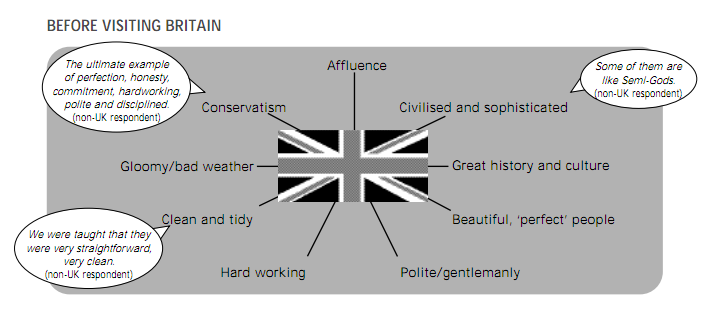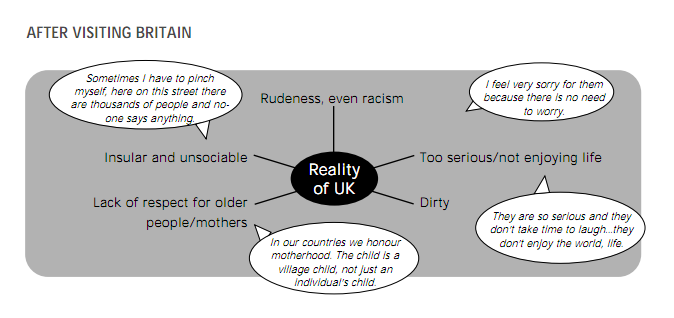"As it seems to be the day for chucking one's opinion into the fray, here is mine, as an immigrant of 23 years to these lovely shores. Many British people seem to find foreigners challenging. This a country which runs on rules, etiquette and routine. Foreigners are, de facto, more likely to be ignorant of those rules. Having to explain them is awkward. Awkwardness must be avoided at all costs. Don't get me wrong - you certainly like us individually and as individuals. But as one group to another, you tolerate us grudgingly; you tut a lot and roll your eyes, when we don't know that one stands on the right of the escalator."Alex Andreou
Showing posts with label britain. Show all posts
Showing posts with label britain. Show all posts
07 January 2025
A new theory of why Brits don't like immigrants #awkward
19 February 2025
What do Indians think about British aid?
Following an exchange with Ian Birrell last week, I asked an entirely unrepresentative group of six Indian friends what they thought (all economists with degrees from UK or US). In general the British media's take seems to have been pretty devoid of voices of actual Indians who are not also politicians.
My hypothesis: that whilst Indian politicians might not want the stigma of aid, that people living in extreme poverty tend to be grateful when they get some free money, and don't really care where it comes from.
None of my friends knew of any surveys or data on the subject (though someone did remind me of this book from interviews with 6,000 aid recipients, not from India, who were in general grateful for the support but also had their criticisms).
Two of them agreed with me
"People would probably not care where aid is coming from. To people in the poorest sections, there is very little that distinguishes Britain from the politicians in Delhi in so far as both are equally removed."and
"India does need the aid of course (small or big is irrelevant). Any extra help to India's efforts to bring down inequality and deliver services to the poor is highly appreciated, the important thing to worry about is the effectiveness of this aid."
A third argued that it is about modalities
"Overall the debate about aid is clear, it is important, and it is a safety net for the poor. The debate over DFID money is not about aid in general, it is about the modality of delivery, the quantity of aid, and the ability of DFID to hold the Government of India to account for the way this aid is spent. All of this considered, I think it makes sense for DFID to reduce the amount of aid it gives to India directly and maybe, channel it through the World Bank or UNICEF or the like."The other three mostly disagreed
"whether the extremely poor would be happy to receive any extra amount that might come their way irrespective of source—hell yes! They don’t care whether it’s DfID or Delhi. But is that a reason strong enough to justify Britain’s aid to India? I am someone who feels we (India) don’t need aid (British or otherwise). What we need is fixing the various inefficiencies in how we target and deliver health, education, free ration and the entire gamut of public services to the poor, and this is something India needs to figure out for itself."and
"Public opinion is not super supportive, and Indians mostly
1. Don't give a damn about aid
2. Are suspicious of most state actors, but think it does have a role (which can't be filled by DFID)
3. Are paranoid about foreign intervention and control (we did have the east India company!)
Obviously though the response would be different if you were to ask the direct beneficiaries, but it isn't easy to assess the counterfactual. It's unlikely they would not have received support in the absence of DFID. My guess is if you did a census - 80% would not know or care about aid, 18% would oppose on nationalist grounds and 2% would support!"and
"It makes a lot of sense for DFID to pull out of India and spend that money in Bangladesh, Cambodia, or Indonesia, where it can do as much good (dense poor populations) but is unlikely to run into that same thicket of issues (at least on the UK domestic front).
Can DFID money do good in India? Yes. Do I think DFID are better than other donors at figuring out where to spend? Probably yes (for the most part). Does DFID involvement in India endanger UK aid even elsewhere? Almost certainly so!
It's not worth the tradeoff."
I think at this point I may lean toward the issue of modalities - whilst giving cash to Indian governments might be best ruled out, should we really rule out supporting civil society or even individuals?
What do you think?
02 January 2025
Everything you need to know about Britain and the EU
When the crazy radicals at the White House and the Economist magazine think Britain would be worse off outside the EU... just get a grip Britain. Get a grip. That is all.
30 August 2024
Modern Growth and Development in the UK
We may still be coming through the deepest recession in living memory, but we are for the most part incomparably better off than we were in the Silver Jubilee year [1977]. Incomes have doubled on average. We need devote much less of our spending to necessities such as food, leaving us free to spend more on leisure pursuits. As a nation, we are vastly better educated. We have moved decisively away from a manufacturing economy towards one based on services. Many more of us work in professional and whitecollar occupations. Women are much more established in the labour market and have made particularly substantial strides in educational attainment.From IFS, Jubilees compared: incomes, spending and work in the late 1970s and early 2010s
18 January 2025
Subscribe to:
Posts (Atom)
loading..


